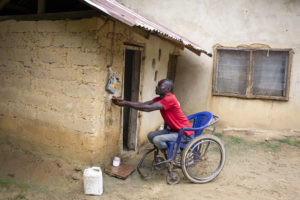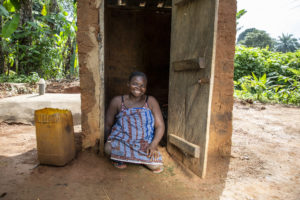October 9, 2019
By: Noga Flexer, United Purpose
The Rural Sanitation and Hygiene Promotion in Nigeria (RUSHPIN) Programme, implemented by United Purpose and funded by the United Nation’s Global Sanitation Fund (through WSSCC) aims to end open defecation and poor hygiene practices in Nigeria using the innovative ‘Community-led Total Sanitation’ (CLTS) technique. The CLTS technique empowers communities to collectively change their sanitation and hygiene behaviour, ensuring all community members are included throughout and “no one is left behind” — the key tenant of the WSSCC’s strategy. Special provisions are made throughout the programme to ensure the inclusion of often overlooked community members, including women and those with physical disabilities.
Activities implemented by United Purpose and its local partners strive to ensure total inclusion and incorporate communities in the process of finding innovative ways to make toilets and hand washing stations accessible. This could include building Tippy Taps at a lower height than standard for wheelchair users. If individuals are unable to build their own facilities, other community members are encouraged to assist them and take shared responsibility for the sanitation of their environment. Keeping with this year’s theme of ‘Clean Hands for All’, I share the stories of two individuals with physical disabilities whose lives have been transformed through RUSHPIN. Here, I write about David and Martina, both residents of rural communities in Cross River State, whose stories are below.
David Undie

David Undie – a person with disability transformed his latrine after triggering. Photo Credit: United Purpose, Jason Florio
Before United Purpose came to his village as part of the RUSHPIN Programme, David did not have an accessible toilet he could use, or any hand washing facilities. Instead, David — who lost his legs as a teenager due to poisoning — was forced to crawl on the jungle floor every time he wanted to relieve himself, dodging faeces, insects and snakes as he went. His hands and knees still bear the scars brought on due to open defecation to this day.
Upon return to his home after relieving himself, David could not wash his hands with soap, as his village has no running water. Without understanding the crucial importance of hand washing, David would cook, eat and play with his young children with the same dirty hands. The whole family’s health suffered, but no one knew the true cause.
When United Purpose engaged David’s village, and explained the benefits of using sanitary latrines that are adjacent to hand washing facilities with soap, David and his entire community were spurred to action. Enlisting the help of his brother and other family members, an accessible latrine was constructed for David, and a Tippy Tap — which doesn’t require running water — was built just outside. To keep with the WSSCC and United Purpose key tenant that no one should be left behind in sanitation or hygiene, United Purpose staff demonstrated to David and his family how a Tippy Tap should be constructed so that David and his children were able to reach it and properly wash their hands with soap.
A number of years later, David is delighted with the difference United Purpose engagement has had on his community, which is now cleaner, and its habitants healthier. Locally recruited Water, Sanitation and Hygiene Committees (WASHCOMS) inspect both toilets and hand washing facilities regularly, to make sure all are still in order, and anyone who needs help maintaining their facilities receives it.
Martina Abeshi

Single mother, Martina is the mother of two teenage boys and runs her own hairdressing business to support her family. After her village was triggered she had toilet constructed next to her home. Photo Credit: United Purpose, Jason Florio
Martina’s legs did not form properly during her childhood, and she has never been able to walk. While this would create challenges for anyone, Martina’s struggle was exacerbated by not having access to a toilet or hand washing facilities. As a child her mother would carry her to the bush to relieve herself, and after she married her husband would help too. However, with the tragic loss of her husband at a young age, and with her mother rapidly aging, Martina was forced to crawl into the bush on her hands to relieve herself.
Fearful of snakes and insects, as well as the threat of sexual violence every time she ventured into the bush, Martina could not properly focus on her family or budding hairdressing business before United Purpose came to her village.
As part of the engagement by the United Purpose Rural Sanitation and Hygiene Programme (RUSHPIN), Martina’s community were shown how to construct an accessible toilet and Tippy Tap for her. Within just a few weeks from the point of engagement, and in exchange for some free hairdressing, Martina’s fellow villagers built her accessible facilities fit for any aspiring businesswoman.
Nowadays, Martina is both happier and healthier. No longer forced to face the danger and discomfort of the bush every time she needs to use the toilet, and no longer wasting money for hospital visits for her kids to treat diseases carried by dirty hands, Martina can focus all her energy on her business. Her hairdressing skills are well-known throughout Local Government Areas (LGAs) across her state, and she is often invited to neighbouring communities to braid hair.
Through engagement with United Purpose, Martina can finally live her life to the fullest, grow her business, and fund her children’s education. The training truly left its mark on her, and she now spreads her knowledge about the importance of hygiene, including proper hand washing at critical times, to all those she meets.
Subscribe to our mailing list to receive regular updates from the Global Handwashing Partnership or follow us on social media.
© 2017 The Global Handwashing Partnership (GHP).